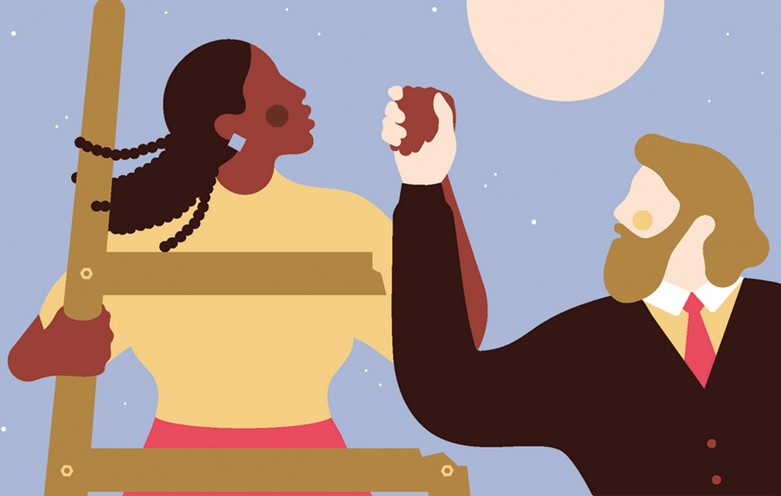How To Influence Without Authority - 6 Key Tips
The Fundamental Principle Of How To Influence Without Authority
We live in an interconnected world and knowing how to influence
without authority is an increasingly important communication skill.
There are many situations at work or in your personal life where you are not in charge, you do not have formal authority, and yet you need to resolve things and get things done.
A major focus of this site is on thinking skills and this article is part of a series on the art of persuasion, communication and change.
This material is grounded in my own business career over 45 years and in this article I am going to share some important tips on how to influence without authority, and it all starts with Newton's Third Law Of Motion:
"For every action there will ways be an equal and opposite reaction."
(1) Assume everyone is a potential ally "We are more united and have far more in common with each other, than things that which divides us." These words were spoken by UK MP Jo Cox in her maiden speech to Parliament in 2015. One year later she was murdered and her words went viral. I recall becoming very aware
of this when I first traveled to, lived and worked in various countries
in South East Asia. I noticed very quickly that despite our ethnic, cultural
and other differences, at root we all want the same things. We value the
same things. We see things in the same way. We have more in common. We all want to be
loved, to be respected, we all want the best for our children, we all
want to good health, at the most basic level we all want food, sex,
shelter and money. (2) Identify the trading currencies I want to introduce the idea of primary and secondary currencies. Understanding this and how it works will give you a significant edge in how to influence without authority. I have written a comprehensive and practical article on this and I strongly recomend that you read this because it will considerably expand your understanding of how to influence without authority. How To Benefit From The Unseen Margins These tips on primary and secondary currencies can give you: Example: Because
I am a businessman I automatically seek primary currency in all of
my interactions with other business people. In my area of business, which is the fuel sector, I build long-term relationships with key people. I always ask myself: "How can I help this person?"
There is an important business relationship I have with a major supplier, and over the past 2 years I have
undertaken research projects for him at at the expense of a lot of my time. anMore recently I have undertaken a major
marketing initiative for him - which was also time consuming. And here's the key point, I did all this
knowing full well that what he asked me to do was very unlikely to
succeed, but he was committed to these activities and so I gained some major goodwill with this guy for having
tried. There will come a point when I can call in these favours by asking for more favourable terms on a major fuel transaction. A few additional points on the discount structure could mean a large amount of additional money to me.
6 Key Tips On How To Influence Without Authority
(3) Clarify what you want, when and why
It is important to be very clear in your own mind about what you want from a potential ally.
[a] Separate organisational goals from personal goals.
- There are different contexts in which you may be seeking to influence people and your approach needs to tailored accordingly.
- There is a difference between organisational goals and personal goals.
- The other person may respond positively and support our personal goals but be reluctant to suppport your organisational goals if they do not align with the other person's organisational objectives.
[b] Be clear about priorities and timescales
- You also need to be clear about your priorities and the order of your priorities, and timescales.
- Are you able to play the long game - or are you under pressure to achieve your goals quickly?
[c] Is your goal a one-off or a repeat?
- Can you afford to risk burning a relationship to achieve an important one time goal?
- Or are you looking for a longer term relationship with potential repeated involvement from your contact?
Your clarity about these points will shape your approach to engaging with the other person.
Example:
As I have outlined above, I am always seeking secondary currency opportunities that I can leverage into significant amounts of primary currency.
My specific goals are introductions to new potential high quality buyers or sellers, and to attract luctrative new business opportunities.
I am very clear and specific about my commercial objectives.
My timescales are usually long-term and strategic and I am prepared to play the long game.
(4) Building and utilising relationships
[a] Build credibility & trust
- The comedian Steve Martin, once said that his advice for aspiring entertainers was to “...be so good they can’t ignore you...”.
- A well earned reputation for knowing what you are talking about will open doors and attract support.
- Even more importantly, is a reputation for trust and integrity coupled with a preparedness to share your knowledge and experience.
[b] How can I add value to this person or this situation?
- One of the key questions to ask yourself is: "What does the other person or people really want and how can I help them get it?"
- Thinks carefully in terms of primary and secondary currencies.
[c] Mobilize your allies
- In an organisational context you will benefit from the support of others with whom you have trust and credibility and who share your goals.
- You will benefit from emotional, practical and political support.
[d] Drop your ego
- An important, and sometimes difficult, lesson to learn in how to influence without authority is to give the other person the credit for the achievement of your goal.
- It is the result that matters and allowing the other person to look good can be an important part of your success equation.
- "High EQ and low ego" is an effective motto.
Example:
Each of the 4 points above and the 4 points below encapsulate my whole approach to influencing people over whom I have no authority.
Over time it has become a mindset to building a business.
(5) Understand the other person's situation
[a] What is affecting the other person?
It
is useful to understand - or attempt to understand - the influences, pressures and requirements of a potential ally.
Once
you focus on this you can directly and indirectly ascertain a lot of
information about the other person's situation and especially about what is important to them.
[b] Where is the common ground and what is non-negotiable?
- Finding the common ground will show where your interests are aligned, and you can build on this.
- Understanding the non-negotiable areas enables you to demonstrate that you understand the other persons' constraints and boundaries and to steer away from possible confrontation.
[c] Listen hard and seek to understand
- Listening is fundamental for all effective communication.
- The essence of how to influence without authority is seeking to understand and listening mindfully to really hear the other person’s needs.
- You have to be continually seeking to up your game and keep asking yourself: "What do they see that I don’t see?”
[d] Only bring practical solutions
- The other person most likely has enough of their own issues and problems to deal with, so bringing practical solutions to the table that are aligned with your common goals will help build your credibility and move you closer to your objectives.
(6) Knowing when the time is right to trade

- You have to earn the right to trade currency with the other person.
- Once you have undertaken the analysis of the other person's situation and what is important to them, identified trading currencies and where necessary improved your relationship, then (and only then) are you in a position to trade with the other person - when the time is right.
- The
timing will dictated by their attraction and need for what you have to offer
balanced against your need for what they have to offer.
Free Downloads:
Influence Without Authority - Summary Notes
Influence Without Authority - Full Notes
Further Reading:
Persuasion
[1] The Art Of Persuasion The One Fundamental Principle - Create A Win-Win
[2] The Art Of Persuasion Advanced Communication Skills - Gaining BuyIn
[3] The Art Of Persuasion Planning For Success - Here's How To Do It!
Change
Getting From A to B Is Not Aways A Straight Line
Group Culture - The Invisible Software That Rules Your Life
Change Questions To Change Your Outcomes
Communication
The Power Of Working With The Front Line - Influence Without Authority
Return from "Change Questions" to: Communication Persuasion and Change
Or to: Walking The Talk
LATEST ARTICLES
The Inner Weight of Shame - Sustained By Attentional Fixation
 A Mind That Is Continuously Engaged In Self-Surveillance. Shame is one of the heaviest inner burdens a human being can carry. It does not announce itself loudly or demand attention through drama. Inst…
A Mind That Is Continuously Engaged In Self-Surveillance. Shame is one of the heaviest inner burdens a human being can carry. It does not announce itself loudly or demand attention through drama. Inst…Does Prayer Work? The Psychology of Prayer, Meditation and Outcomes
 Reality Is A Complex System Of Countless Interactions - Including Yours. So does prayer work? The problem is that the question itself is usually framed in a way that guarantees confusion. We tend to a…
Reality Is A Complex System Of Countless Interactions - Including Yours. So does prayer work? The problem is that the question itself is usually framed in a way that guarantees confusion. We tend to a…Living in Survival Mode Without Surrendering Mental Authority
Living in Survival Mode Without Surrendering Mental Authority
 Clear Thinking When You’re Just Trying to Stay Afloat. Many people today are overwhelmed because they are living in survival mode - not temporarily, but as a persistent condition of life. For many, th…
Clear Thinking When You’re Just Trying to Stay Afloat. Many people today are overwhelmed because they are living in survival mode - not temporarily, but as a persistent condition of life. For many, th…Manifestation Without Magic: A Practical Model
 Manifestation without magic is not a softer or more intellectual version of popular manifestation culture. It is a different model altogether. Popular manifestation teachings tend to frame reality as…
Manifestation without magic is not a softer or more intellectual version of popular manifestation culture. It is a different model altogether. Popular manifestation teachings tend to frame reality as…Staying Committed When You Can't See Progress - The Psychology of Grit
 Uncertainty Is Not The Absence Of Progress, Only The Absence Of Reassurance. One of the most destabilising experiences in modern life is not failure, but uncertainty and staying committed when you can…
Uncertainty Is Not The Absence Of Progress, Only The Absence Of Reassurance. One of the most destabilising experiences in modern life is not failure, but uncertainty and staying committed when you can…The Battle For Your Mind - How To Win Inner Freedom In A Digital Age Of Distraction
 From External Events to Inner Events. We often think of “events” as things that happen out there: the traffic jam, the rude comment, the delayed email reply. But what truly shapes our experience is wh…
From External Events to Inner Events. We often think of “events” as things that happen out there: the traffic jam, the rude comment, the delayed email reply. But what truly shapes our experience is wh…How to See Your Thoughts Without Becoming the Story
 A Practical Guide to Thought-Awareness. You can spend your life inside the stories of your mind without ever learning how to see your thoughts clearly and objectively. Most of the stuff we tell oursel…
A Practical Guide to Thought-Awareness. You can spend your life inside the stories of your mind without ever learning how to see your thoughts clearly and objectively. Most of the stuff we tell oursel…The Collison Decision Matrix - A Simple Framework for Better Choices
 The Collison Decision Matrix Is A Practical Everyday Thinking Tool. Most of us spend a surprising amount of time worrying about decisions. From small ones such as what to wear, what to eat, what to te…
The Collison Decision Matrix Is A Practical Everyday Thinking Tool. Most of us spend a surprising amount of time worrying about decisions. From small ones such as what to wear, what to eat, what to te…The Power Of Asking The Right Question
 The Power Of Asking The Right Question Lies In The Quest For Insight. To experience the power of asking the right question you must develop the practice of asking questions. The best way to improve th…
The Power Of Asking The Right Question Lies In The Quest For Insight. To experience the power of asking the right question you must develop the practice of asking questions. The best way to improve th…Site Pathways
 Here is a site pathway to help new readers of Zen-Tools navigate the material on this site. Each pathway is based around one of the many key themes covered on this site and contain a 150 word introduc…
Here is a site pathway to help new readers of Zen-Tools navigate the material on this site. Each pathway is based around one of the many key themes covered on this site and contain a 150 word introduc…How To Live With Contradiction - Beyond Thought Let Stillness Speak
 A major impact on so many peoples' lives is the situational contradiction of unfilled realistic expectations. So where does all this leave us? Well here we are, with mental equipment that is more lim…
A major impact on so many peoples' lives is the situational contradiction of unfilled realistic expectations. So where does all this leave us? Well here we are, with mental equipment that is more lim…





